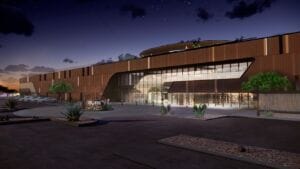Brandi Stoll vividly remembers the terror she felt in seeing her 1-year-old girl Alizah floating face down in the family’s pool last year.
“I rushed over and pulled her out by her tiny little swim diaper and instantly started to give her CPR,” said Stoll of Ahwatukee. “It all happened so fast.”
Alizah was rushed to Banner Desert Medical Center’s trauma unit and placed on a breathing tube, among other treatment. If she survived, chances were high she’d have neurological issues. Nearly a year has passed since that frightening day on July 31, and this story has a happy ending. Alizah, now age 2, made a full recovery with no physical or mental delays, and no other medical issues.
READ ALSO: 4 ways parents can keep up with kids’ summer learning
Alizah’s family wants to recognize the upcoming anniversary by raising awareness of water safety, to prevent others from experiencing what her loved ones went through.
With triple-digit temperatures driving many Arizonans to pools and other bodies of water to cool down, Banner Health safety experts say it’s important to review pool-safety practices.
“Drowning can happen to anyone, regardless of where you live or what you do,” said Tracey Fejt, RN, Banner Health injury prevention coordinator.
So far this year, there have been 42 drownings in Maricopa and Pinal counties, according to the Drowning Prevention Coalition of Arizona. That includes 11 children ages 5 or younger, two teens and 29 adults.
An important part of water safety is being aware of the ABCs of drowning prevention, Fejt said. These include:
Adult supervision: Always have eyes on kids and be close enough to touch them. In big family gatherings, designate an adult to be a lifeguard to constantly watch the kids. Also, more adults drown than kids, so adults should have a swim buddy.
Barriers between children and water. Make sure there is a five-foot fence around the pool and that the pool gate latches by itself. Don’t forget that kids can crawl through doggie doors so block the doors’ access to pools.
Classes in CPR for adults and swim lessons for kids are essential. Drowning victims have a much higher rate of survival if CPR is administered immediately.
Coast-guard approved. “Floaties’’ or “water-wings’’ can pose a danger to children. Use only items that have labels indicating they are approved by the U.S. Coast Guard.
Banner Children’s, part of nonprofit Banner Health, cares for more kids than any other health system in Arizona. From well-child exams to treatment of minor injuries and illnesses to management of chronic conditions, the experienced team at Banner Children’s provides comprehensive, family-centered medical care for every child in Banner Health centers and clinics, emergency rooms, hospitals and outpatient facilities. Services include: behavioral health, cancer care, diabetes and endocrinology, digestive care, emergency care, heart care, neurosciences, primary care, surgery and more. For more information about Banner Children’s services, physicians and locations, visit bannerchildrens.com.



